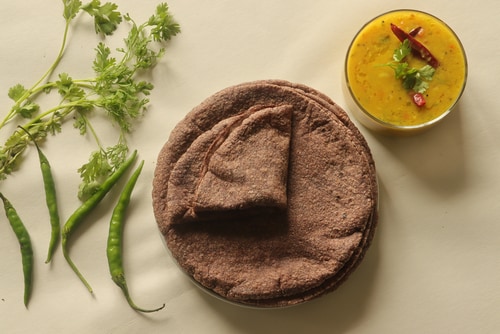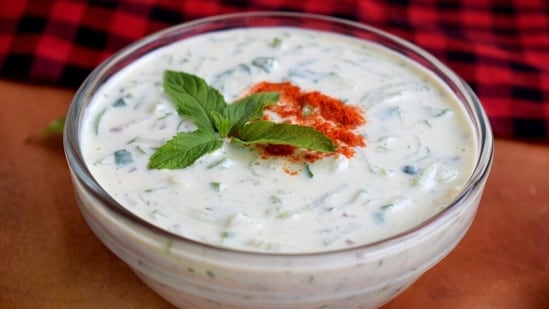Our Terms & Conditions | Our Privacy Policy
GI cancer surgeon reveals 4 habits to avoid and suggests 3 dietary choices to balance your gut microbiome | Health
Gut health is one of the most talked-about topics in wellness discourse because of its close connection with other aspects of health, like mental well-being and immunity, through the gut-brain and gut-immunity axes. But you cannot talk about gut health without spotlighting the microbiome. At the very root of gut health is the gut microbiome. All the major functions of the gut, from digestion to nutrient absorption, are supported by the complex community of bacteria and other microbes in the gut. But this efficiency depends on maintaining a balance, and what you eat plays a vital role in keeping your gut microbiome healthy.
Add probiotics like raita to your diet.(Shutterstock)
ALSO READ: Hepatologist explains how gut influences memory, mood and mental wellbeing; unpacks why gut may be the ‘second brain’
Dr Hemant Jain, Consultant Laparoscopic and GI Cancer Surgeon, Lilavati Hospital and Research Centre, shared with HT Lifestyle that traditional Indian foods help to support gut microbiome.
He explained, “The gut microbiome, or group of bacteria, fungi, and other microbes that reside in our gut and help our digestive tract as a whole, from immunity to metabolism. Indian traditional food is largely respected due to its nature to heal and diversity, yet recent interpretations and lifestyle have induced imbalance in our gut.”
The attraction to processed fast foods is alarming in today’s time, as Dr Jain warned that they disrupt the gut microbiome’s balance and increase the risk of many gastrointestinal disorders. Dr Jain added, “Today’s food culture, urban living, and food processing have caused a significant imbalance of gut microbiota in most Indians, which may produce a variety of disease conditions such as gastrointestinal disorders, obesity, diabetes and even mental illnesses.”
4 things to avoid
 Processed foods like burgers and French fries are increasingly common among youth, but they pose serious health hazards to gut health.(Shutterstock)
Processed foods like burgers and French fries are increasingly common among youth, but they pose serious health hazards to gut health.(Shutterstock)
The first step to maintaining a healthy gut is eliminating some common yet harmful habits. Dr Jain shared which habits you should change:
1. Eating a lot of processed foods:
- Indian urban and semi-urban households experienced a dramatic increase in packet foods of snacks, soft beverages, and ready-to-eat foods.
- These highly processed foods have low dietary fibre and high added sugars and unhealthy fat content, which negatively impact the richness and functionality of gut microbiota.
2. Lack of dietary diversity:
- Traditional Indian diets were once regional and vegetarian, involving frequent use of lentils, whole grains, vegetables, seasonal fruits, seeds, and naturally fermented foods (such as curd, pickles, and idli/dosa batter).
- The trend of ease and the globalised food culture trend have limited dietary variety, thus denying healthy gut flora the diversity of fibres and polyphenols that they live on.
3. Increased use of antibiotics and pesticide exposure:
- Inappropriate use of antibiotics and consumption of chemical pesticides through non-organic foods have the potential to disturb the balance in the gut microbiome.
- It also sometimes represses beneficial species.
4. Sedentary lifestyle:
- Sedentary life, stress, lack of sleep, and irregular eating patterns are now prevalent in urban India.,
- This also disrupts gut balance, suggesting the necessity of an integrated gut care regimen.
Better dietary choices for a healthy gut
 Choose healthy desi options like ragi roti and lentils.(Shutterstock)
Choose healthy desi options like ragi roti and lentils.(Shutterstock)
Now that you know the triggers of gut imbalance and are aware of precautionary measures, let’s take a look at some dietary choices that can support and improve your gut microbiome. Dr Hemant Jain highlighted these 4 dietary options:
1. Include a blend of vegetables like spinach, methi, carrots, beetroots, broccoli, and fruits, and nuts, providing a range of fibres and phytonutrients to feed an array of microbes.
2. Ancient Indian fermented foods such as dahi, buttermilk, idli, dosa, pickles, and kanji are natural probiotics and centuries old in creating gut harmony. These can increase counts of beneficial bacteria if consumed every day.
3. Prioritising top whole grains, including millets (ragi, jowar, bajra) and brown rice, lentil and legume types like masoor dal, moong dal, toor dal, chana, rajma, kala chana, chickpeas.
Note to readers: This article is for informational purposes only and not a substitute for professional medical advice. Always seek the advice of your doctor with any questions about a medical condition.
Images are for reference only.Images and contents gathered automatic from google or 3rd party sources.All rights on the images and contents are with their legal original owners.



Comments are closed.